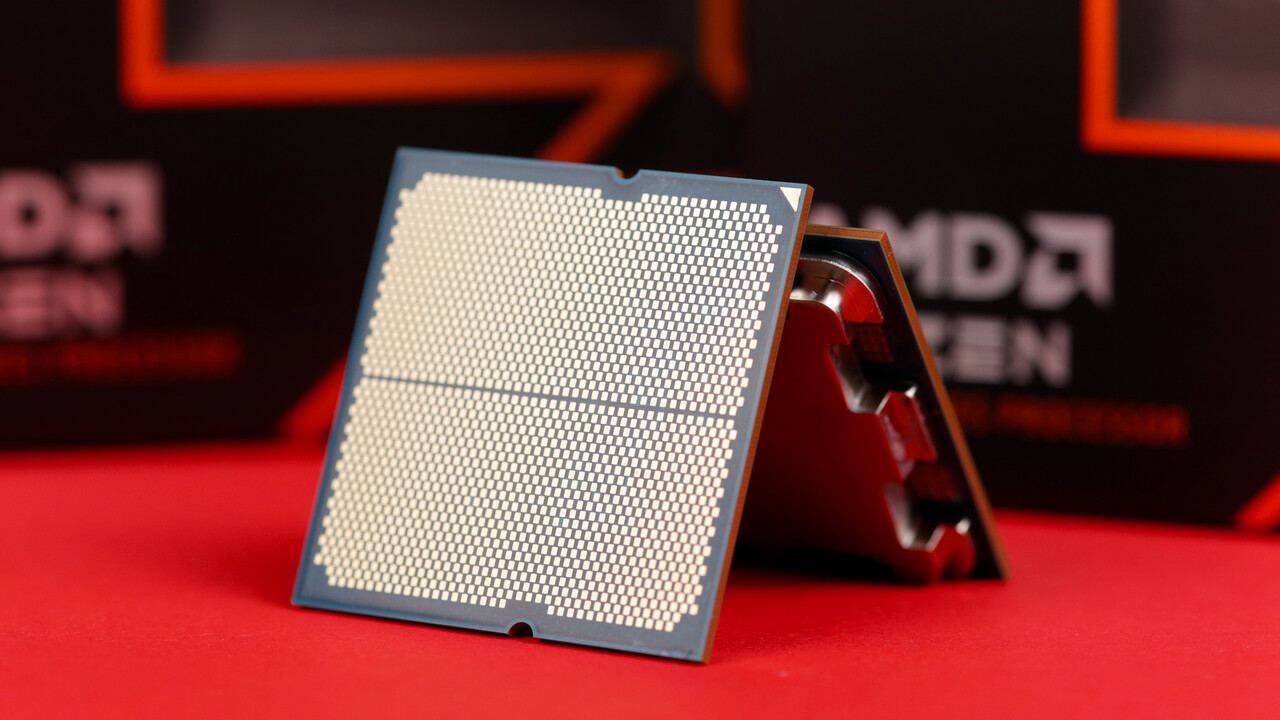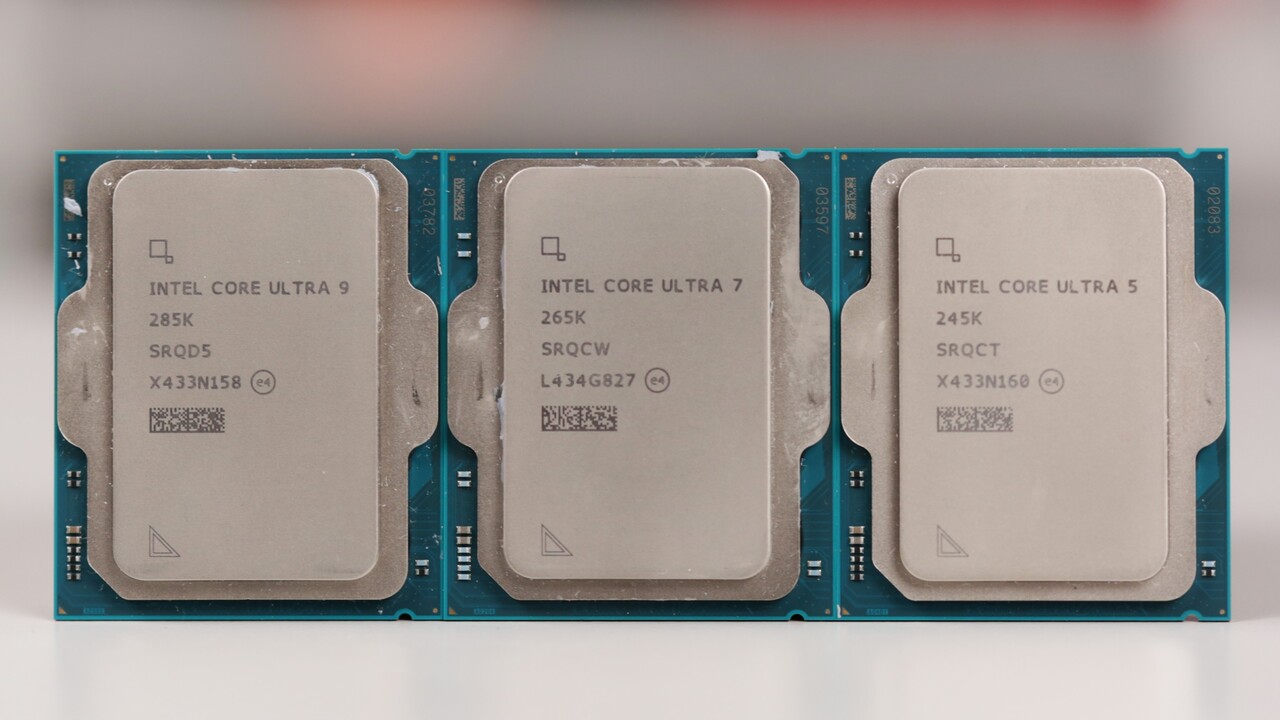Zen 5 vs. Zen 4 Benchmarks: AMD Ryzen 9000X(3D) vs. 7000X(3D) at 4.8 GHz in Comparison 250 comments
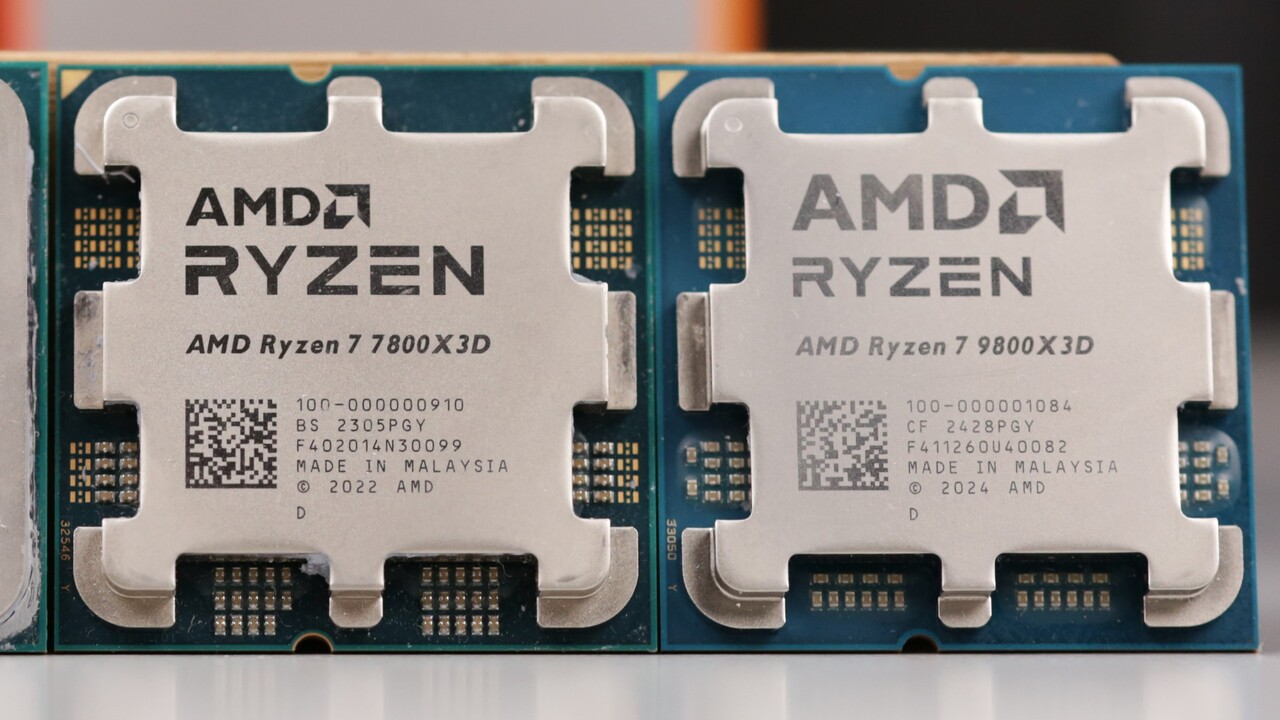
The Ryzen 9000X with Zen 5 only showed a single-digit FPS increase over the Ryzen 7000X with Zen 4 in the summer gaming tests; the same level was expected for the Ryzen 7 9800X3D over the Ryzen 7 7800X3D. But the 9800X3D test showed 14% more gaming performance. How is this possible?
Table of Contents AMD Ryzen 9000X(3D) vs. 7000X(3D) at 4.8 GHz in comparison Ryzen 7 9800X3D: Where does the extra performance come from? Benchmarks with standardized clock speed Test results Conclusion
Ryzen 7 9800X3D: Where does the extra performance come from?
The Ryzen 7 9800X3D clocks up to 5.2 GHz instead of 5.0 GHz, slightly higher than the Ryzen 7 7800X3D and also uses this maximum boost clock frequency in games, while the Ryzen 7 7800X3D runs at just under 5.0 GHz. However, the difference in games is not as great as in applications, where the two processors are separated by up to 500 MHz.
A second “out of the box” difference: the Ryzen 7 9800X3D can use DDR5-5600, while the Ryzen 7 7800X3D only uses DDR5-5200.
Ultimately, none of these things explain why the increase from X3D to X3D is greater than from X to X. It’s the cache that makes the new Zen 5 architecture even faster in games than was already the case with Zen 4. The following test isolates the effect.
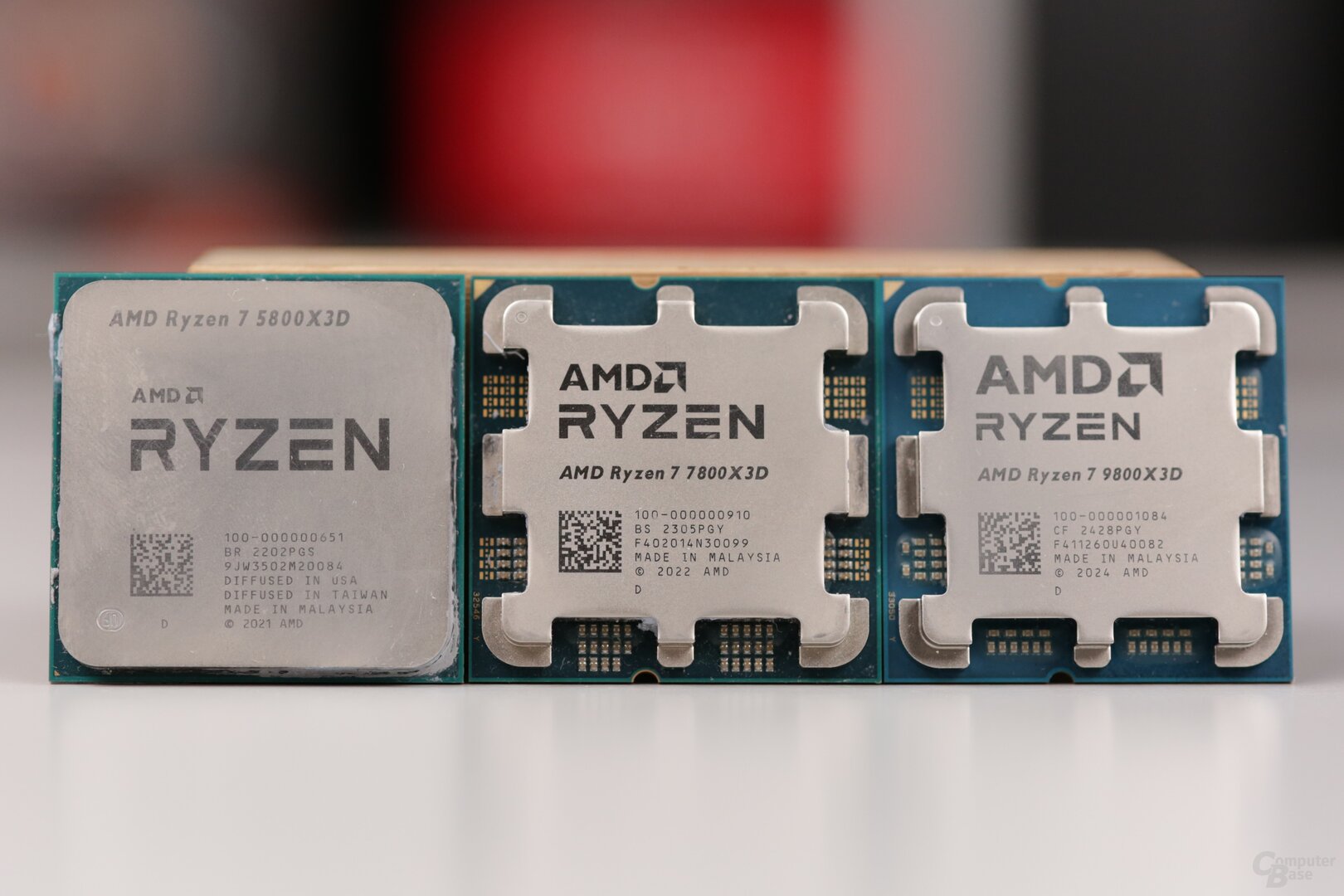 AMD Ryzen 7 9800X3D and its predecessors
AMD Ryzen 7 9800X3D and its predecessors
Benchmarks at normalized clock speed
The increased positive influence of cache in games is demonstrated by tests carried out by Techoutil with Ryzen 7 9800X3D, Ryzen 7 7800X3D, Ryzen 7 9700X and Ryzen 7 7700X with the CPU clock frequency standardized to 4.8 GHz and the Memory clock frequency standardized to DDR5. -5200. All four processors feature an eight-core chipset and active simultaneous multithreading (SMT). 4.8 GHz was chosen because the Ryzen 7 7800X3D, as the processor with the lowest clock speed, can handle it even under high load.
There is still a bug with the Ryzen 7 9800X3D. The Ryzen 7 7700X and Ryzen 7 9700X were shifted to this using a fixed multiplier of 48, while the Ryzen 7 7800X3D without an adjustable multiplier used a negative offset, which allowed the processor a maximum of 4.8 GHz. The Ryzen 7 9800X3D crashed when loading games when setting a fixed multiplier it has – limiting the max clock per core to 4,800MHz via Performance Boost Overdrive helped here. Apparently the current BIOS of the Asus ROG X870E Crosshair Hero or the current AGESA from AMD still has a bug on this point.
This is how the processors were brought to 4.8 GHz, the BIOS setting of the AMD Ryzen 7 9800X3D processor at maximum. per core clock (PBO) AMD Ryzen 7 9700X per 48 multiplier AMD Ryzen 7 7800X3D per clock offset (-250 MHz) AMD Ryzen 7 7700X with 48 multiplier
CPUs configured in this way differ only in architecture and within architecture in the use of 3D V-Cache (X3D).
Test results
The following benchmarks were performed in the same configuration and with the same drivers and settings as the Ryzen 7 9800X3D test, but fewer games were used in order to slightly reduce the time required. An average of the seven games shows the expected result: while Zen 5 only increases the FPS by nine percent compared to Zen 4 without standardized clock, fifteen percent faster.
The reason for this is that the 7800X3D gains “only” 36 percent compared to the 7700X in the selected games, while the 9800X3D gains 43 percent compared to the 9700X, or seven percentage points more.
There are two exceptions to the small run: In F1 24 and Horizon Forbidden West, both X3D versions show comparable gains compared to their non-X3D counterparts.
The power consumption of the Ryzen 7 9800X3D can be significantly reduced by setting the limit to 4.8 instead of 5.2 GHz: instead of 87 watts, the average of the tested games is 62 watts, the Ryzen 7 7800X3D goes from 64 slightly below to 57 watts. back – but also 200 MHz lower clocks ex works.
Conclusion
The Zen 5 architecture actually benefits much more from the use of the 3D V-Cache in games, as the tests without the influence of the processor and memory clock clearly show. In the test, the Ryzen 7 7800X3D gains “only” 36% on average over a Ryzen 7 7700X with the same clock speed, while the Ryzen 7 9800X3D has a 43% lead over the Ryzen 7 9700X with the same clock speed.
CPU Gaming Performance (Avg. FPS) Power Consumption (Average) Normalized to 4.8 GHz, DDR5-5200CL32 AMD Ryzen 7 9800X3D 100% (171 FPS) 100% (62 W) AMD Ryzen 7 9700X 70% ( 120 FPS) 90% (56 W)AMD Ryzen 7 7800X3D 87% (149 FPS) 92% (57 W) AMD Ryzen 7 7700X 64% (109 FPS) 81% (50 W) Factory settings AMD Ryzen 7 9800X3D 100% (181 FPS) 100% (87 W) AMD Ryzen 7 9700X 69% (125 FPS) 100% (87 W) AMD Ryzen 7 7800X3D 87% (158 FPS) 73% (64 W) AMD Ryzen 7 7700X not tested Games: Anno 1800, Baldur’s Gate 3, Cyberpunk 2077, F1 24, Homeworld 3, Horizon Forbidden West, Starfield
Interesting: Even in a “stock-to-stock” comparison, i.e. with slightly higher CPU and memory clock speeds, the Ryzen 7 9800X3D and Ryzen 7 7800X3D are fifteen percent apart in a course reduced to seven games. The fact that there are not more is perhaps due to a measurement inaccuracy of one or two percent, but in the end it once again shows that the new processor wins in games thanks to the cache compared to the old one, not because of the higher clock (memory) speed.
This is not because the cache, which now sits under the CPU chipset, has been revolutionized in other respects, but rather because the drag released by the cache in games has an even greater effect on the Zen 5 architecture.
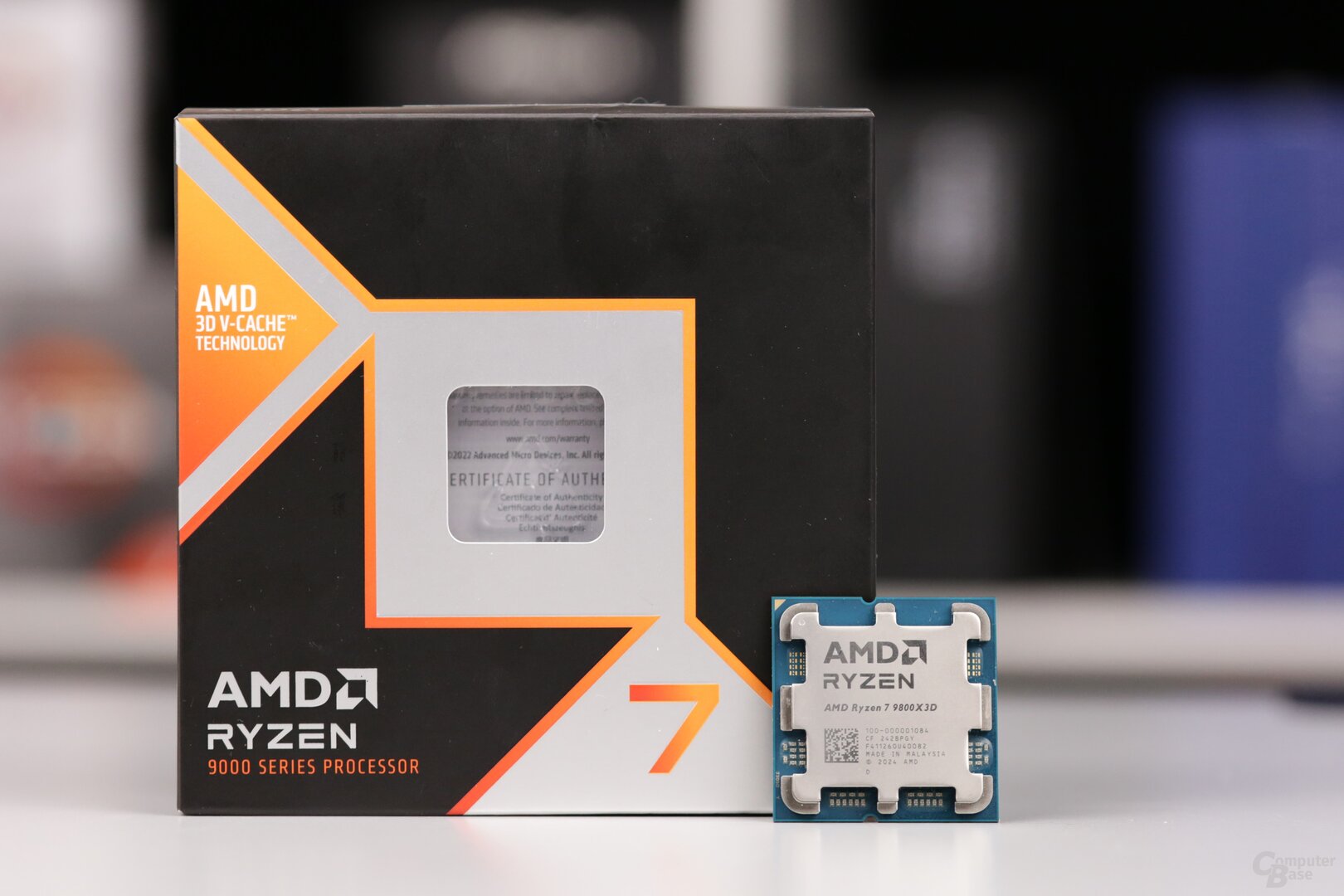 AMD Ryzen 7 9800X3D in testing
AMD Ryzen 7 9800X3D in testing
Was this article interesting, useful, or both? The editorial team appreciates any support from Techoutil Pro and disabled ad blockers. Learn more about ads on Techconseil.
Topics: AMD Processors AMD Granite Ridge AMD Ryzen 9000 Ryzen Zen

Marc deciphers processors by testing their performance for gaming, content creation, and artificial intelligence.
